
The economy of Cuba is a mixed planned economy dominated by state-run enterprises. The government of Cuba owns and operates most industries and most of the labor force is employed by the state. Following the fall of the Soviet Union in 1991, the ruling Communist Party of Cuba encouraged the formation of worker co-operatives and self-employment. In the late 2010s, private property and free-market rights along with foreign direct investment were granted by the 2019 Cuban constitutional referendum. It has also been acknowledged that foreign direct investment in various Cuban economic sectors increased before 2019 as well. As of 2000, public-sector employment was 76% and private-sector employment was 23%, compared to the 1981 ratio of 91% to 8%. Investment is restricted and requires approval by the government. The government sets most prices and rations goods to citizens. In 2019, Cuba ranked 70th out of 189 countries, with a Human Development Index of 0.783, placed in the high human development category. As of 2012, the country's public debt comprised 35.3% of GDP, inflation (CDP) was 5.5%, and GDP growth was 3%. Housing and transportation costs are low. Cubans receive government-subsidized education, healthcare, and food subsidies.

The Cuban Missile Crisis, also known as the October Crisis of 1962, the Caribbean Crisis, or the Missile Scare, was a 1-month, 4 day confrontation between the United States and the Soviet Union which escalated into an international crisis when American deployments of missiles in Italy and Turkey were matched by Soviet deployments of similar ballistic missiles in Cuba. Despite the short time frame, the Cuban Missile Crisis remains a defining moment in U.S. national security and nuclear war preparation. The confrontation is often considered the closest the Cold War came to escalating into a full-scale nuclear war.

The Spanish–American War was an armed conflict between Spain and the United States. Hostilities began in the aftermath of the internal explosion of USS Maine in Havana Harbor in Cuba, leading to U.S. intervention in the Cuban War of Independence. The war led to the U.S. emerging predominant in the Caribbean region, and resulted in U.S. acquisition of Spain's Pacific possessions. It led to U.S. involvement in the Philippine Revolution and later to the Philippine–American War.
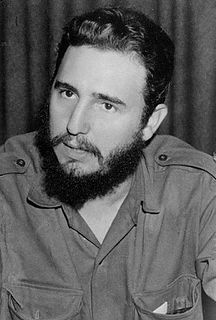
Fidel Alejandro Castro Ruz was a Cuban revolutionary, lawyer, and politician who was the leader of Cuba from 1959 to 2008, serving as the prime minister of Cuba from 1959 to 1976 and president from 1976 to 2008. Ideologically a Marxist–Leninist and Cuban nationalist, he also served as the first secretary of the Communist Party of Cuba from 1961 until 2011. Under his administration, Cuba became a one-party communist state; industry and business were nationalized, and state socialist reforms were implemented throughout society.

Corey Woods (born January 12, 1970), better known by his stage name Raekwon, is an American rapper and a member of Wu-Tang Clan. He released his solo debut Only Built 4 Cuban Linx... in 1995 to universal critical acclaim. He has since recorded numerous solo albums, as well as continuing to work with Wu-Tang and providing an extensive number of guest contributions to other hip hop artists' works (such as his appearance on the first single of the critically acclaimed Outkast album, Aquemini). He is the founder of his own label ICE H2O Records.
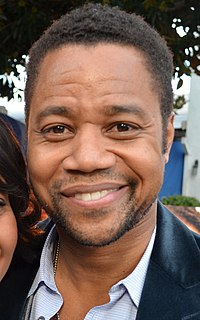
Cuba Mark Gooding Jr. is an American actor. After his breakthrough role as Tre Styles in Boyz n the Hood (1991), he appeared in A Few Good Men (1992), The Tuskegee Airmen (1995), Outbreak (1995), and Jerry Maguire (1996), for which he won the Academy Award for Best Supporting Actor.
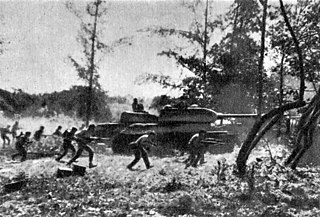
The Bay of Pigs Invasion was a failed landing operation on the southwestern coast of Cuba in 1961 by Cuban exiles who opposed Fidel Castro's Cuban Revolution. Covertly financed and directed by the U.S. government, the operation took place at the height of the Cold War, and its failure led to major shifts in international relations between Cuba, the United States, and the Soviet Union.
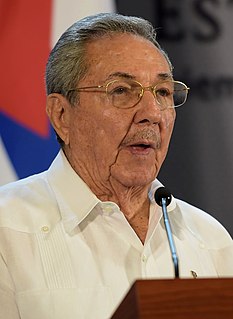
Raúl Modesto Castro Ruz is a Cuban retired politician and general who served as the first secretary of the Communist Party of Cuba, the most senior position in the one-party communist state, from 2011 to 2021, succeeding his brother Fidel Castro.

The Cuban Revolution was an armed revolt conducted by Fidel Castro and his fellow revolutionaries of the 26th of July Movement and its allies against the military dictatorship of Cuban President Fulgencio Batista. The revolution began in July 1953, and continued sporadically until the rebels finally ousted Batista on 31 December 1958, replacing his government. 26 July 1953 is celebrated in Cuba as the Day of the Revolution . The 26th of July Movement later reformed along Marxist–Leninist lines, becoming the Communist Party of Cuba in October 1965.

Mark Cuban is an American billionaire entrepreneur, television personality, and media proprietor whose net worth is an estimated $4.3 billion, according to Forbes, and ranked #177 on the 2020 Forbes 400 list. He is the owner of the Dallas Mavericks professional basketball team of the National Basketball Association (NBA), co-owner of 2929 Entertainment, and chairman of AXS TV. He is also one of the main "shark" investors on the ABC reality television series Shark Tank.

The United States embargo against Cuba prevents American businesses, and businesses organized under US law or majority-owned by citizens of the United States, from conducting trade with Cuban interests. It is the most enduring trade embargo in modern history. The US first imposed an embargo on the sale of arms to Cuba on March 14, 1958, during the Fulgencio Batista regime. Again on October 19, 1960, almost two years after the Cuban Revolution had led to the deposition of the Batista regime, the US placed an embargo on exports to Cuba except for food and medicine after Cuba nationalized the US-owned Cuban oil refineries without compensation. On February 7, 1962, the embargo was extended to include almost all exports. The United Nations General Assembly has passed a resolution every year since 1992 demanding the end of the US economic blockade on Cuba, with the US and Israel being the only nations to consistently vote against the resolutions.

Cuban Americans are Americans who trace their ancestry to Cuba. The word may refer to someone born in the United States of Cuban descent or to someone who has emigrated to the United States from Cuba. Cuban Americans are the third largest Hispanic American group in the United States.

Cubans are people born in Cuba, and people with Cuban citizenship. Cuba is a multi-ethnic nation, home to people of different ethnic, religious and national backgrounds. As a result, Cubans generally do not equate their ethnicity with nationality but with citizenship and their allegiance to Cuba.

Nochebuena is a Spanish word referring to the night of Christmas Eve and celebrated on 24 December every year. For Latin American cultures, it is often the biggest feast for the Christmas season and is the annual Spanish tradition. Some regions include a fasting before midnight dinner. In Spain, Latin America, Pacific Islands, and the Philippines, the evening consists of a traditional family dinner. Roasted pig, or lechón is often the center of Nochebuena for feasts around the world. It is believed that the tradition dates back to the 15th century when Caribbean colonists hunted down pigs and roasted them with a powerful flame.

Cuba, officially the Republic of Cuba, is a country comprising the island of Cuba, as well as Isla de la Juventud and several minor archipelagos. Cuba is located where the northern Caribbean Sea, Gulf of Mexico, and Atlantic Ocean meet. Cuba is located at the east of the Yucatán Peninsula (Mexico), south of both the American state of Florida and the Bahamas, west of Hispaniola, and north of both Jamaica and the Cayman Islands. Havana is the largest city and capital; other major cities include Santiago de Cuba and Camagüey. The official area of the Republic of Cuba is 109,884 km2 (42,426 sq mi). The main island of Cuba is the largest island in Cuba and in the Caribbean, with an area of 104,556 km2 (40,369 sq mi). Cuba is the second-most populous country in the Caribbean after Haiti, with over 11 million inhabitants.

Cuba and the United States restored diplomatic relations on July 20, 2015. Relations had been severed in 1961 during the Cold War. U.S. diplomatic representation in Cuba is handled by the United States Embassy in Havana, and there is a similar Cuban Embassy in Washington, D.C. The United States, however, continues to maintain its commercial, economic, and financial embargo, making it illegal for U.S. corporations to do business with Cuba.

The Communist Party of Cuba is the sole ruling party of the Republic of Cuba. The party leads a one-party authoritarian regime in Cuba where dissidence and political opposition are prohibited and repressed. The Cuban constitution ascribes the role of the party to be the "leading force of society and of the state". It was founded on 3 October 1965 as a successor of the United Party of the Cuban Socialist Revolution, which was in turn made up of the 26th of July Movement and Popular Socialist Party that seized power in Cuba after the 1959 Cuban Revolution.

Alberto Yarini y Ponce de León (1882-1910) was a Cuban racketeer and pimp during the period of the Cuban War of Independence against Spain. Yarini was well known in his time, is Cuba's most famous pimp, and came to symbolize the concept of Cubanidad, the Cuban national identity, to many Cubans, long after his death.

Cuba competed at the 2015 Pan American Games in Toronto, Ontario, Canada, from July 10 to 26, 2015.
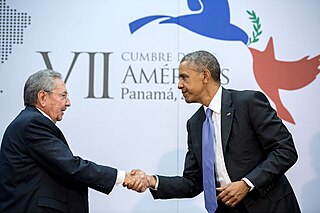
The Cuban thaw was the normalization of Cuba–United States relations that began in December 2014 ending a 54-year stretch of hostility between the nations. In March 2016, Barack Obama became the first U.S. president to visit Cuba since Calvin Coolidge, in 1928.
















